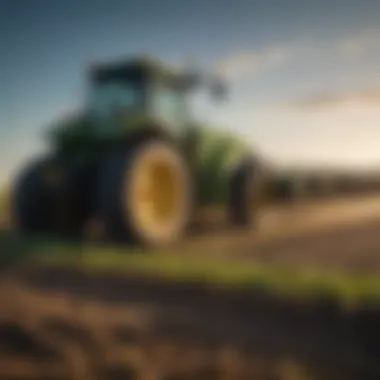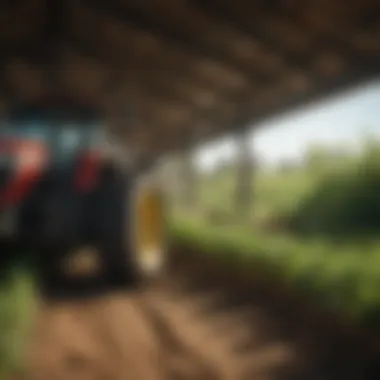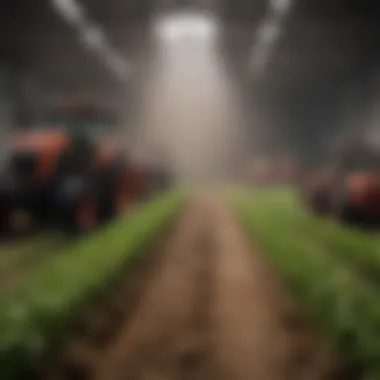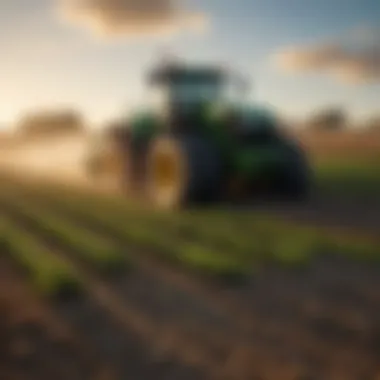Sloan Deere's Impact on Modern Agriculture Practices


Intro
Agriculture continually evolves as it responds to new challenges and opportunities. Sloan Deere emerges as a vital figure in modern agriculture, pushing the frontier of farming practices through innovation and expertise. This article seeks to unpack how his methods resonate in today’s farming endeavors. From sustainability to technology, understanding his insights offers significant value to not only farmers but also anyone who engages with agriculture.
Key Concepts and Terminology
Understanding the language of agriculture is essential to grasp the innovations brought forth by Sloan Deere. This section delineates key terms and provides historical context that frames his contributions effectively.
Basic Definitions
- Sustainability: Farming practices that meet current needs without compromising future resources.
- Technology Integration: The incorporation of modern technology in traditional farming practices to enhance productivity and efficiency.
- Agroecology: A holistic approach that considers ecological relationships in farming.
Historical Context
The agricultural landscape has undergone substantial changes over the past century. Early mechanization laid the groundwork for the modern age of farming, with inventions such as the tractor revolutionizing production. As environmental concerns surfaced, sustainable approaches began influencing industry paradigms. Innovations like precision agriculture following advances in satellite technology have propelled these changes. Understanding this lineage enriches the appreciation of Sloan Deere's contemporary innovations.
Recent Innovations and Trends
Sloan Deere embodies the intersection of cutting-edge innovations and sustainable practices, reflecting the latest trends in agriculture. This section will explore crucial advancements in these domains.
Technological Advancements
Recent years have seen remarkable technological developments in agriculture, facilitated by data analytics, artificial intelligence, and IoT devices. For instance:
- Drone Technology: Employed for crop monitoring and health assessments.
- Data Management Software: Used to analyze yields and optimize resources.
- Automation: Robotics are increasingly deployed for planting and harvesting tasks.
Sustainable Practices
Deere emphasizes environmentally conscious methods:
- Crop Rotation: Reduces soil depletion and pest outbreaks.
- Cover Cropping: Enhances soil health by preventing erosion and nutrient loss.
- Integrated Pest Management (IPM): Combines different management approaches to minimize chemical use while controlling pests effectively.
"Sloan Deere’s fusion of technology and sustainability exemplifies a forward-thinking framework for future agriculture."
Practical Applications and Techniques
To ensure the relevance of these innovations, this section offers practical applications and techniques for today’s agricultural practitioners.
Step-by-step Guides
- Implementing Precision Agriculture: Begin with collecting field data using sensors. Analyze this data to apply water and nutrients in specified areas, yielding better results with less waste.
- Adopting Sustainable Practices: Start small by integrating cover crops into your existing rotations. This will gradually improve soil health and reduce chemical dependencies.
Case Studies
Examining real-world examples helps elucidate these concepts. Consider the application of drone technology by a family-owned farm in Illinois, which improved crop yield by 30% over three seasons. Likewise, a case study from California showcases how cover cropping transformed barren fields into productive land, all thanks to long-term commitment to sustainability.
Preamble to Sloan Deere
Sloan Deere represents a pivotal figure in contemporary agriculture. His emphasis on innovation and sustainability is reshaping practices within the farming sector. Understanding his contributions provides insight into the future trajectory of the industry. More than just a name, Sloan Deere embodies a movement towards integrating modern technology with time-tested farming traditions.
The significance of Sloan Deere lies in his commitment to addressing critical challenges in agriculture today. These challenges range from resource scarcity to the impacts of climate change. By focusing on solutions that prioritize ecological balance, he offers a pathway for farmers to enhance productivity without compromising the environment.
Sloan's approach is both practical and aspirational. He illustrates how farming can adapt to new realities while preserving land for future generations. Analyzing his career allows us to appreciate how one individual's vision can cascade into broader industry shifts. This narrative is crucial for understanding where agriculture is headed in an ever-evolving landscape.
As we delve deeper, we will explore the specific practices, technologies, and educational initiatives that have defined Sloan Deere’s legacy. Each element contributes to a bigger picture of modern agriculture—one where innovation meets sustainability. This exploration will reveal not just the methods he advocates, but also the mindset necessary for future farmers to thrive in this complex environment.
Historical Context of Agriculture


Understanding the historical context of agriculture is crucial in appreciating the advancements made by innovators like Sloan Deere. Agricultural practices have evolved significantly from primitive methods to the sophisticated techniques we see today. This evolution provides a framework to examine how past approaches inform current practices and future possibilities. The transformation of farming is not merely about specific tools and crops; it encompasses social, economic, and environmental dimensions that shape agricultural productivity and sustainability.
Evolution of Farming Practices
The journey of farming practices can be traced back thousands of years to rudimentary methods of planting and harvesting. Early agricultural communities relied on manual labor, local flora, and fauna, honing their skills through trial and error.
As societies grew, so did the complexity of farming techniques. The introduction of crop rotation and selective breeding marked significant progress. Farmers began to understand the importance of soil health and biodiversity, elements that are essential for maximizing yields. These traditional techniques laid the groundwork for future developments, influencing modern practices.
Today, farming has embraced innovations such as hydroponics, aquaponics, and vertical farming. These methods reflect a shift towards sustainability and efficiency, responding to the growing demands for food security in an increasingly urbanized world.
Influence of Technology in Agriculture
Technology has profoundly impacted agriculture, shaping not only how we farm but also the outcomes of farming endeavors. From the invention of the plow to contemporary advancements like drones and artificial intelligence, the agricultural landscape has undergone major transformations.
One of the most notable advancements is precision agriculture, which involves using data analysis and technology to improve crop management. Farmers can now monitor soil quality, crop health, and weather conditions in real-time. This level of insight allows for informed decision-making, optimizing resource use, and minimizing waste.
Moreover, the advent of biotechnology has changed the way crops are developed. Genetically modified organisms (GMOs) and bioengineered crops have the potential to increase yields, resist pests, and adapt to climatic changes. However, this comes with ethical considerations and debates regarding their long-term impact on health and the environment.
"Understanding the historical context of agriculture is foundational to grasping its future direction and innovations, emphasizing the connection between past practices and modern techniques."
Sloan Deere's Early Career
Understanding Sloan Deere's Early Career is crucial as it sets the foundation for his later contributions to agriculture. His initial experiences shaped his perspective and approach towards modern farming techniques. It is essential to recognize how his academic choices and hands-on projects influenced his innovative mindset.
Academic Background
Sloan Deere pursued his education in agricultural science, which equipped him with a strong theoretical understanding of farming principles. His choice of institutions was not random; he selected programs known for their rigorous curriculum and emphasis on practical applications. This combination allowed him to learn from both textbooks and fieldwork.
During his time at university, Deere engaged in various research projects that focused on soil health and crop yield optimization. He often participated in cooperative extension programs, which helped bridge the gap between academia and real-world farming challenges. This early exposure to both education and hands-on practice highlighted the importance of scientific research in improving agricultural outcomes.
Initial Projects in Agriculture
Sloan's first projects in agriculture aimed to test the effectiveness of sustainable farming practices. One notable project involved working with local farmers to implement crop rotation and cover cropping. These methods not only improved soil fertility but also contributed to reducing pest pressure. The outcomes of these projects showed promising results, enabling Sloan to gain credibility within the agricultural community.
In addition to these sustainability efforts, he ventured into precision agriculture. His work included utilizing data analysis to make informed decisions about planting and harvesting. This early investment in technology, combined with a commitment to sustainable practices, marked the beginning of his influential role in modern agriculture.
Through these experiences and early projects, Sloan Deere laid a solid groundwork for the innovations he would later introduce to the industry. His ability to combine academic knowledge with practical solutions set him apart as a forward-thinking leader in the agricultural sector.
Innovative Practices Introduced by Sloan Deere
Sloan Deere has played a significant role in transforming modern agriculture through innovative practices. His approach emphasizes sustainability and technological advancement, which are important for ensuring future food security. The introduction of new techniques not only improves productivity but also addresses environmental concerns that are critical in today’s agricultural landscape.
Sustainable Farming Techniques
One of the cornerstones of Sloan Deere's contributions is his focus on sustainable farming techniques. These practices aim to maintain the health of the land while providing food for a growing population. They are designed with several benefits in mind:
- Soil Health: Techniques involve crop rotation, cover cropping, and reduced tilling, all of which contribute to maintaining soil structure and fertility.
- Water Conservation: Innovative methods such as drip irrigation and rainwater harvesting help in conserving water. This is crucial in areas experiencing drought conditions.
- Biodiversity: By promoting a variety of crops and livestock, farmers can create a more resilient agricultural ecosystem.
Deere's emphasis on sustainability encourages farmers to think long-term, rather than focusing solely on immediate profits. His methods demonstrate that while sustainability might require an initial investment, it pays off by yielding better crops and preserving resources for future generations.
Integration of Precision Agriculture
Precision agriculture is another area where Sloan Deere has made significant contributions. This approach leverages technology to enhance farming efficiency and productivity. By integrating data analytics with traditional farming methods, farmers can monitor their operations with unprecedented precision. Key aspects include:
- Data-Driven Decisions: Farmers use data collected from various sources like satellite imagery and soil sensors to make informed decisions about planting, fertilizing, and irrigating.
- Resource Optimization: By understanding the specific needs of crops, farmers can apply inputs like fertilizers and pesticides more accurately. This reduces waste and minimizes environmental impact.
- Increased Yields: Precision farming techniques often lead to higher agricultural productivity. By tailoring actions to the specific conditions of a field, farmers can maximize outputs while minimizing costs.
"The integration of precision agriculture not only enhances efficiency but also fosters a proactive approach to farming, helping to anticipate and solve issues before they escalate."


Impact of Sloan Deere on Modern Agriculture
The influence of Sloan Deere on modern agriculture is multifaceted, touching various dimensions of the agricultural landscape. His work not only emphasizes the importance of sustainable practices but also integrates technological advancements that cater to contemporary farming needs. By highlighting innovative techniques and approaches, Sloan Deere has effectively reshaped how farmers view and engage with agricultural processes.
Sloan Deere's contributions yield significant benefits, particularly in enhancing productivity and improving crop yield. Farmers are adopting methods leass reliant on chemical fertilizers and pesticides, instead, turning towards methods that maintain soil health and ecosystem balance. This shift towards sustainability represents a larger movement within agriculture, aimed at promoting environmental stewardship while still meeting the demands of a growing population.
Key areas impacted by Sloan Deere can be categorized as follows:
- Adoption of sustainable farming techniques
- Integration of precision agriculture tools
- Enhancement of educational resources and community engagement
- Influencing agricultural policies and regulatory frameworks
Through these engagements, Sloan Deere has positioned himself as a critical figure in transforming agricultural practices while influencing prevailing regulations that govern farming operations.
Case Studies of Successful Implementation
Case studies illustrate the practical efficacy of Sloan Deere's innovations. Several farmers who adopted his techniques have reported improvements in yield and profitability. One noteworthy example involves a mid-sized farm in Wisconsin that implemented precision agriculture methods recommended by Deere. By utilizing soil sensors and data analytics, the farm significantly reduced water usage, lowering costs without sacrificing crop output.
Another example is the use of cover cropping strategies he promoted in various regions. Farmers adopting these practices have seen not only a reduction in soil erosion but also improvements in soil fertility over time. These real-life applications reinforce the merit of Deere’s philosophy and the value of his contributions to the agricultural sector.
Influence on Policy and Regulation
Sloan Deere impacts policy and regulation in agriculture, fostering a comprehensive dialogue between lawmakers and farmers. His advocacy for sustainable practices has been instrumental in shaping legislation that prioritizes environmental safety. By collaborating with various stakeholders in the agricultural community, he has highlighted the necessity for regulations that support innovative farming practices while also addressing environmental concerns.
Notably, Deere's efforts have led to the creation of initiatives aimed at incentivizing farmers to adopt eco-friendly practices. This regulatory shift not only facilitates compliance but also encourages a culture of sustainability in the agriculture sector.
Such influences mean that Sloan Deere is not just a promoter of agricultural innovations; he actively participates in refining the policies that sustain these practices long-term. Ultimately, his work shapes not only how farmers grow food but also the future of agriculture as a suitable and viable path towards responsible production.
Community Engagement and Education
Community engagement and education are pivotal components in modern agriculture. As the sector evolves, the need for collective understanding and skill-sharing increases. It serves to connect the innovators like Sloan Deere with local farmers, enhancing the adoption of sustainable practices and advanced technologies.
Sloan Deere's Role in Agricultural Education
Sloan Deere has established himself as a significant figure in agricultural education. His initiatives focus on improving the knowledge base of local farmers. Recognition of the gap in understanding sustainable practices has led to programs aimed at promoting educational frameworks. By collaborating with universities and research institutions, he ensures that the latest scientific findings reach practitioners on the ground.
Educational tours, seminars, and courses are common offerings. These programs often include discussions on crop rotation, soil health, and pest management. Such efforts have not only built a stronger network of informed farmers but have also motivated young people to consider careers in agriculture.
Workshops and Community Outreach
Workshops and community outreach initiatives are critical aspects of Sloan Deere's philosophy. These programs encapsulate hands-on learning experiences. Farmers learn directly from experts during practical sessions that demonstrate new technologies and practices. This makes learning relevant and actionable.
Outreach events often target specific challenges facing local farmers. For instance, a workshop may focus on using drones for crop monitoring. The advantage is clear: farmers can see solutions directly applicable to their operations. Insights shared during these interactions also foster a sense of community among participants.
Overall, the emphasis on education and engagement leads to increased adoption of best practices. This approach not only elevates individual farms but also influences the agriculture sector as a whole.
"Investing in education is investing in the future of agriculture."
By integrating community-driven programs, Sloan Deere lays the groundwork for a new generation of farmers equipped with knowledge and innovation.
Challenges Faced in Implementation
The implementation of innovative agricultural practices often encounters various challenges that can hinder progress. Understanding these obstacles is crucial for appreciating the full scope of Sloan Deere's influence on the modern agricultural landscape. The challenges faced in implementing new strategies and technologies are not just barriers; they can provide insights into the complexities of modern farming, adapting to change, and the overarching economic environment. Addressing these challenges is vital for ensuring that advancements in agriculture can be both impactful and sustainable.
Economic Factors
Economic considerations play a significant role in the successful implementation of new practices in agriculture. Farmers must often operate within tight budgets and limited resources. The cost of adopting new technologies and sustainable practices can deter farmers from making changes, even if those changes are beneficial in the long run.
Several key economic factors influence this scenario:


- Initial Investment: Many modern agricultural tools and techniques require a substantial upfront investment. This includes purchasing precision agriculture equipment or transitioning to organic farming methods, both of which can demand a significant financial outlay.
- Market Demand: The fluctuating nature of market demand for different crops can impact farmers' willingness to invest in innovative practices. If the market for certain crops is unstable, farmers may hesitate to transition to new methods that could lead to financial risk.
- Government Support: The extent of government subsidies and incentives plays a crucial role in mitigating economic challenges. Programs aimed at encouraging sustainable practices can aid farmers in offsetting initial costs, but the availability varies by region and policy changes.
By closely examining these factors, it becomes evident that economic pressures can create a breeding ground for inaction. Understanding these dynamics is essential for stakeholders and policymakers who wish to facilitate the adoption of innovative agricultural practices.
Technological Barriers
The rapid advancement of technology presents both benefits and hurdles for farmers looking to innovate. While precision agriculture and other modern techniques offer remarkable potential, there are several barriers that can impede their adoption.
Some notable technological barriers include:
- Skill Gap: Not all farmers possess the technical skills required to utilize advanced tools effectively. Training and education programs are often necessary to bridge this gap. Without adequate knowledge, farmers may resist adopting technologies that could enhance efficiency and productivity.
- Compatibility Issues: Integrating new technologies into existing farming frameworks can be complex. For example, older machinery may not be compatible with new systems, creating a challenge for farmers who do not wish to invest in completely new equipment.
- Data Privacy Concerns: As agriculture increasingly relies on data collection and analysis, concerns about data security and privacy may arise. Farmers must navigate the legal and ethical implications of data use, which can deter participation in technological advancements.
These barriers highlight that while technology holds great promise for improving agricultural practices, the challenges in its implementation require careful consideration and strategic planning.
Sloan Deere's Vision for the Future
Sloan Deere's vision for the future plays a crucial role in shaping the direction of agriculture. As the landscape of farming evolves, new challenges arise, necessitating innovative solutions and forward-thinking strategies. Sloan's insights focus on sustainability and technology, which are increasingly vital in addressing contemporary issues such as climate change, resource management, and food security. A comprehensive understanding of his vision enables farmers to adapt and thrive in a rapidly changing environment.
Predictions for Agricultural Trends
Sloan Deere's predictions for agricultural trends reflect both current developments and potential future scenarios. Here are a few key points that stand out:
- Increased Automation: Automation will continue to rise, allowing for more efficient farming practices. Robots and AI will take on repetitive tasks, enabling farmers to focus on strategic decision-making.
- Sustainable Practices: There will be a strong push toward sustainable farming methods. This includes organic farming, regenerative practices, and improved soil health management. These elements will ensure long-term productivity and environmental balance.
- Data Utilization: Data-driven farming will dominate. Advances in technology will enable farmers to gather and analyze vast amounts of data. This information will help in making informed decisions, optimizing yields, and minimizing waste.
- Integrated Solutions: A shift towards integrated systems combining crops, livestock, and aquaculture will emerge. This holistic approach can improve resource efficiency and create resilient agricultural ecosystems.
Sloan’s predictions serve not only as foresight but also as a guide for farmers looking to embrace change and implement new strategies.
"Adaptation and innovation are the keys to successful agriculture in the future." - Sloan Deere
Role of Young Farmers and Innovators
Young farmers and innovators are pivotal in shaping the future of agriculture. Their unique perspectives and fresh ideas can rejuvenate the sector. Sloan Deere emphasizes the significance of this group in various ways:
- Embracing Technology: Young farmers are more likely to adopt new technologies such as precision agriculture and data analysis tools. This tech-savvy approach enhances productivity and sustainability.
- Advocating for Change: They often engage in advocacy for policies that benefit agriculture, including support for sustainable practices and rural development initiatives.
- Creating Networks: Young innovators tend to establish networks that promote knowledge-sharing and collaboration. These connections foster an environment where ideas can flourish and lead to impactful changes.
- Sustainability Champions: Many young farmers prioritize environmental responsibility, focusing on practices that ensure long-term resource availability and ecological health.
Finale
The conclusion serves as a vital component of this article, stitching together the various strands of Sloan Deere’s many contributions to agriculture. In this section, we reflect on how his innovative practices in sustainability and technology resonate throughout modern farming landscapes, changing the way we approach agricultural challenges.
Recap of Sloan Deere's Contributions
Sloan Deere’s work encompasses a multitude of advancements that have redefined agricultural methodologies. His strong focus on sustainable farming techniques has encouraged the adoption of practices that respect both the land and the environment. Furthermore, the integration of precision agriculture has enabled farmers to maximize productivity while minimizing waste. This remarkable blend of eco-friendly and technologically advanced methods not only boosts yield but also fosters long-term resilience in agricultural systems. In summary, Deere promotes:
- Sustainability: Advocating for practices that safeguard our natural resources.
- Technology Integration: Utilizing data analytics and modern technologies to enhance farming efficiency.
- Education and Community Engagement: Making knowledge readily accessible to farmers, promoting continuous education and improvement.
These contributions underscore the intricate link between innovation and sustainability in agriculture.
The Path Forward for Agriculture
Looking towards the future, the agricultural sector is at a pivotal crossroads. The challenges posed by climate change, economic fluctuations, and technological disruptions require a proactive approach. Sloan Deere predicts significant shifts in agricultural trends, emphasizing the role of young farmers and innovators.
As the younger generation enters the field, they bring fresh perspectives and an eagerness to embrace new technologies. This next wave of farmers is expected to prioritize sustainable practices even more, pushing the boundaries of innovation further.
Potential trends include:
- Increased usage of renewable energy sources in farming.
- Greater reliance on data-driven decision making.
- Expansion of community-supported agriculture initiatives.
Importance of References
- Credibility: The agricultural industry thrives on data-driven decisions. By citing experts or institutions, we reinforce the authenticity of our findings concerning Sloan Deere's work.
- Accessibility: References provide pathways for readers to explore further. Interested readers can follow the links to originals on agricultural practices or figures which can enhance their understanding.
- Acknowledgment: Highlighting the sources pays homage to the pioneering work done by others in this field.
Considerations for References
- Choose only reputable sources. Institutions like University research papers, government agriculture departments, and recognized agricultural organizations should be prioritized.
- Ensure accurate formatting to maintain professionalism and consistency.
- Keep a mix of primary and secondary sources to provide well-rounded perspectives.
"The farmer has to be an optimist or he wouldn't still be a farmer."
— Will Rogers















